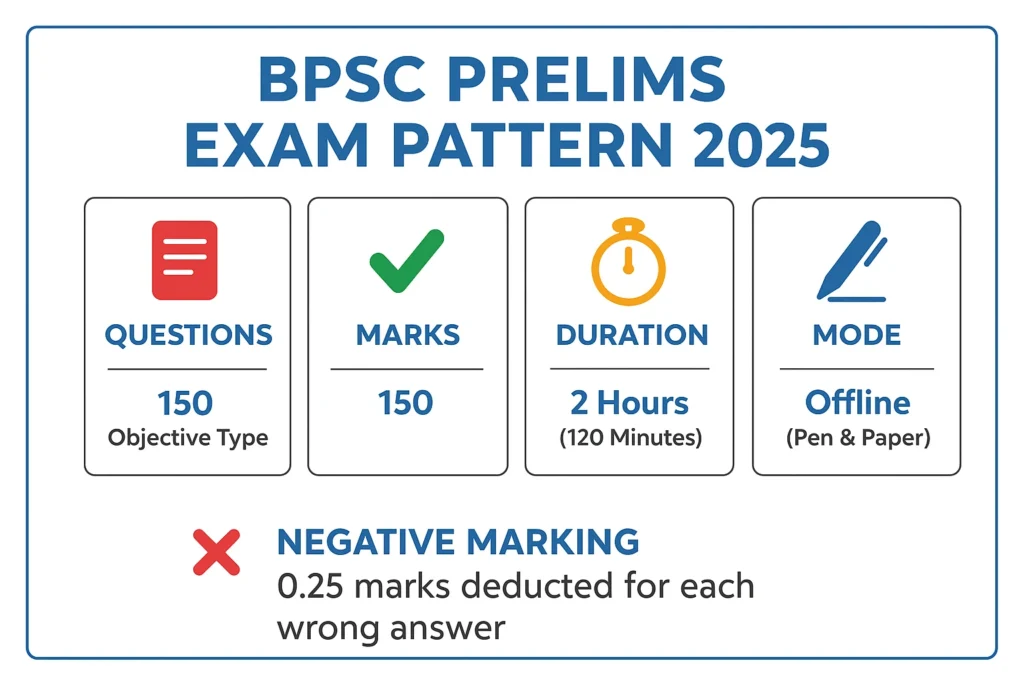The Bihar Public Service Commission (BPSC) exam is one of the most prestigious competitive exams in Bihar, offering candidates the opportunity to join the state’s administrative machinery in roles such as Deputy Collector, DSP, Revenue Officer, and other high-ranking posts. Cracking the BPSC exam requires not only dedication but also a clear understanding of the exam pattern, stages, and syllabus.
In this blog, we’ll break down every detail you need to know to prepare strategically for the BPSC examination.
Overview of BPSC Examination
The BPSC Civil Services Exam is modeled after the UPSC CSE, but tailored to the state level. It tests candidates on a wide range of topics, including general knowledge, current affairs, aptitude, and optional subjects.
The exam is conducted in three stages:
- Preliminary Examination (Prelims) – Screening Test
- Main Examination (Mains) – Descriptive Written Test
- Interview / Personality Test – Final Stage of Selection
Each stage is crucial, as only those who qualify one stage can proceed to the next.

Stage 1: BPSC Preliminary Examination
The Prelims exam is the first hurdle and acts as a screening test.
Key Features of Prelims:
- Type: Objective (Multiple Choice Questions)
- Total Marks: 150 marks
- Duration: 2 hours
- Negative Marking: None (a big advantage compared to UPSC)
- Qualifying Nature: Marks are not counted in the final merit but are crucial for advancing to Mains.
Prelims Syllabus:
The syllabus of the Prelims mainly focuses on General Studies and is heavily influenced by current affairs and state-specific topics.
- General Science
- Current Affairs (National & International Importance)
- History of India & Indian National Movement
- Geography (India & Bihar)
- Indian Polity & Economy
- General Mental Ability
- Events of Bihar (History, Geography, Economy, Culture)
👉 Tip: Since Prelims doesn’t have negative marking, candidates can attempt all questions, which makes smart guessing an important strategy.
Stage 2: BPSC Main Examination
The Mains exam is descriptive and carries the maximum weightage in determining your rank.
Key Features of Mains:
- Type: Written, Descriptive
- Total Papers: 4 papers
- Marks: 900 marks in total (only 3 papers are counted for merit)
- Qualifying Paper: General Hindi (not counted in merit, but compulsory to pass)
Paper-wise Pattern:
- General Hindi (Qualifying)
- Marks: 100
- Minimum Qualifying Marks: 30%
- Topics: Grammar, Essay, Comprehension, Syntax, Vocabulary
- General Studies Paper 1 (300 marks)
- Indian Culture & Modern History
- Statistical Analysis, Graphs, Diagrams
- History of Bihar and its Importance in Indian Freedom Movement
- General Studies Paper 2 (300 marks)
- Indian Polity
- Indian Economy & Geography
- Role of Science & Technology in Development
- Geography of Bihar
- Optional Subject (300 marks)
- Candidates can choose one subject from the list of 34 optional subjects (similar to UPSC).
- Popular choices: History, Sociology, Geography, Public Administration, Political Science, etc.
👉 Tip: Since Optional Paper carries equal weight as GS papers, choosing the right optional subject is a make-or-break decision.
Stage 3: BPSC Interview / Personality Test
This is the final stage of the exam. Candidates who clear Mains are called for the Interview round.
Key Features:
- Marks: 120 marks
- Nature: Personality Test, not just knowledge-based
- Focus Areas:
- General awareness
- Communication skills
- Decision-making ability
- Knowledge of Bihar’s culture, politics, and economy
- Suitability for administrative responsibility
👉 Tip: Confidence, clarity of thought, and awareness of Bihar’s issues are more important than memorized facts.
BPSC Final Merit List
The final merit list is prepared based on:
- Marks obtained in Mains (900 marks)
- Marks obtained in Interview (120 marks)
- Total = 1020 marks
The Prelims marks are not counted in the final merit but are essential for qualifying to Mains.
How to Approach the BPSC Exam Syllabus Strategically
- Focus on Bihar-Specific Topics – BPSC gives significant weight to the state’s history, geography, culture, and economy.
- Current Affairs are Crucial – Both Prelims and Mains require in-depth knowledge of national and international current affairs, with special focus on Bihar.
- Balance GS & Optional Paper – GS gives you stability, while Optional decides your rank.
- Practice Writing Answers – For Mains, descriptive writing practice is the key to success.
- Revise NCERTs & Standard Books – Build conceptual clarity through NCERTs, then move to advanced sources.
Conclusion
The BPSC exam pattern and syllabus may look vast, but with a structured plan and consistent preparation, it’s highly conquerable. Remember, Prelims is just the gateway, Mains is the battleground, and Interview is where your personality shines.
If you aim to crack BPSC, focus on current affairs, Bihar-specific knowledge, strong optional subject preparation, and answer writing practice. With dedication, patience, and smart strategy, your dream of becoming a BPSC officer can turn into reality.
NOTE: Explore How to Overcome Stress and Stay Focused in the Final Month of BPSC Prelims